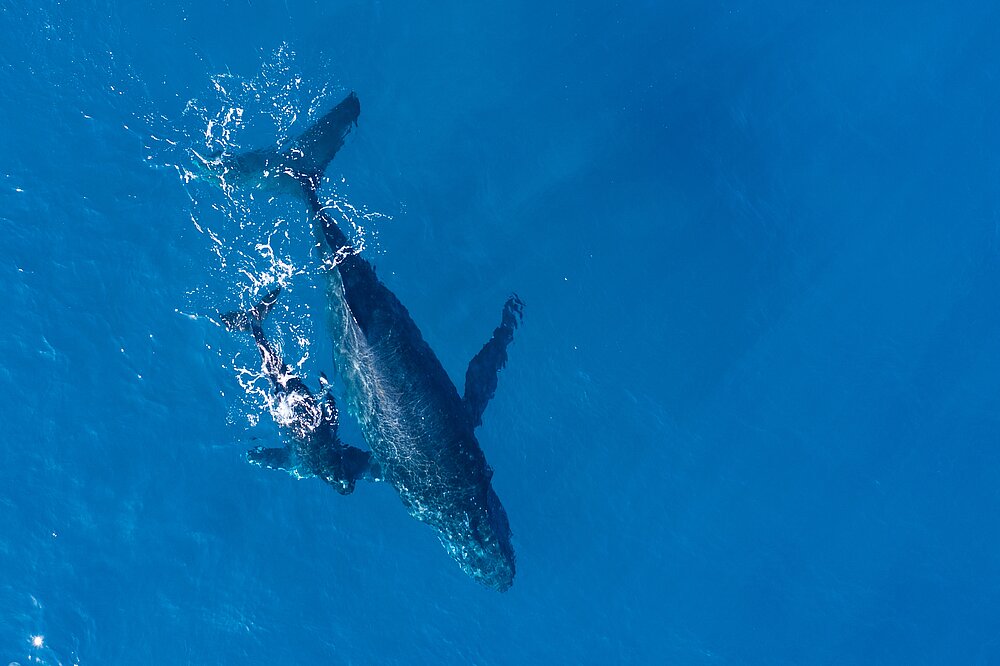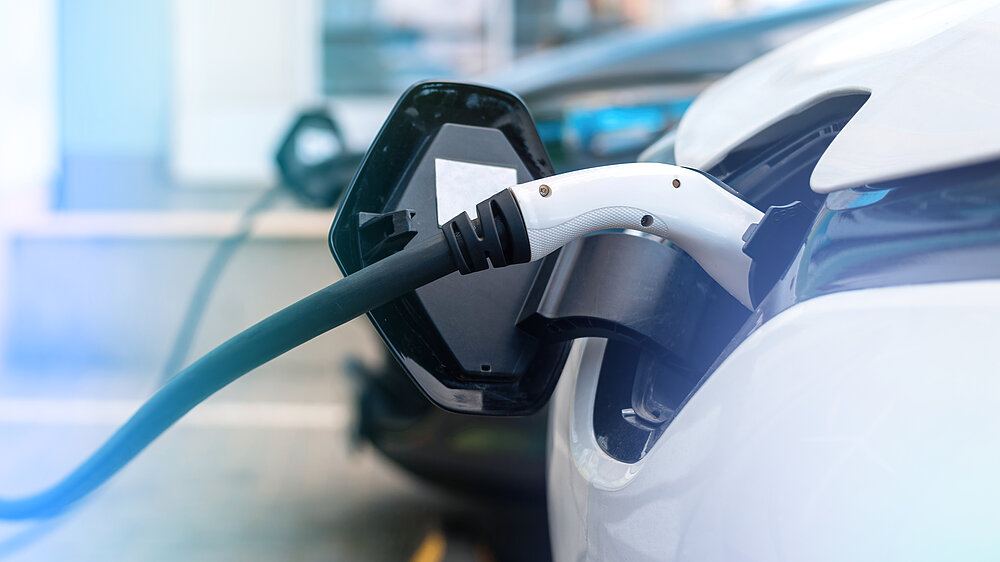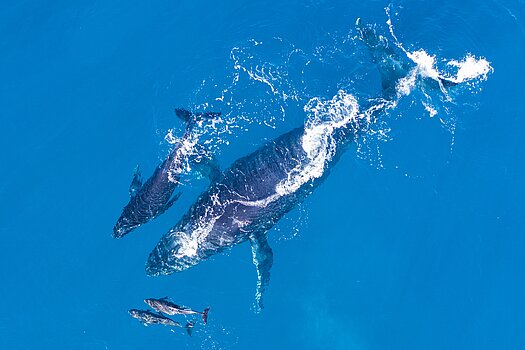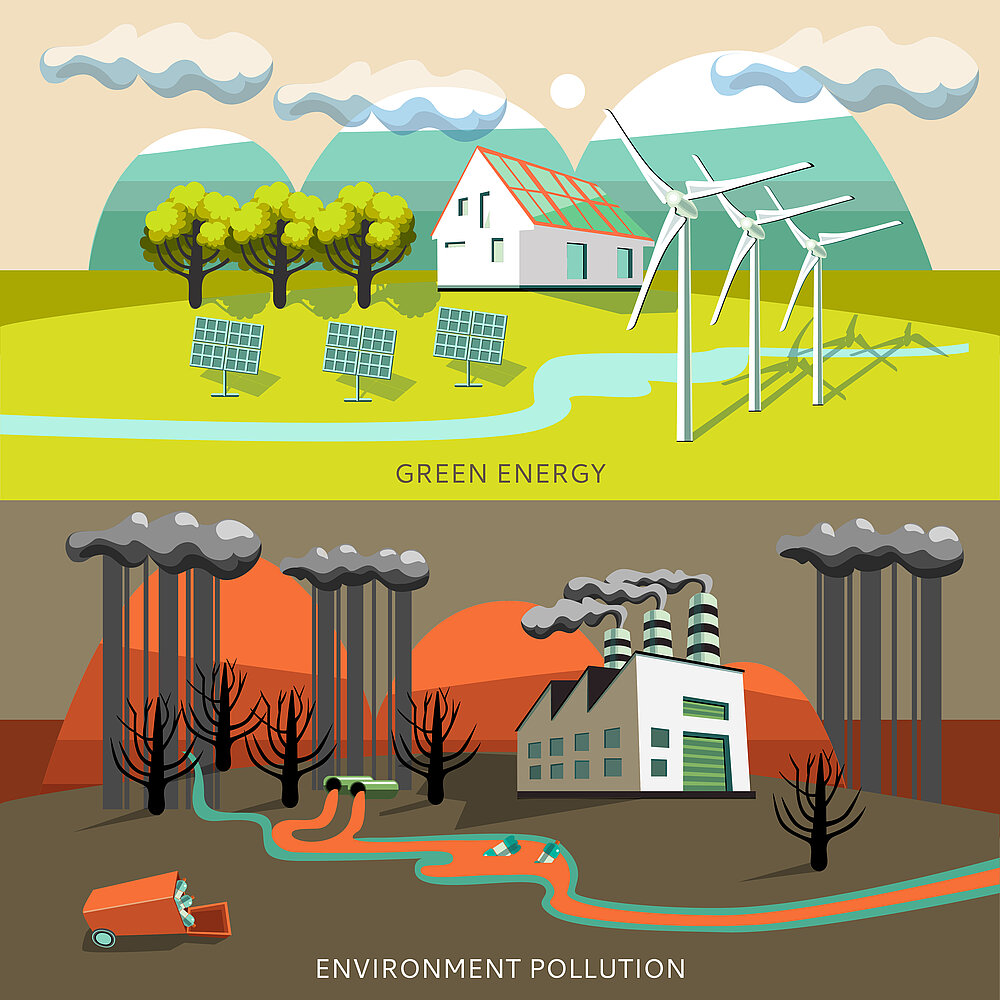Successes for climate protection
Montreal Protocol - ozone hole recovers

The Montreal Protocol is an international environmental agreement which obliges the participating countries to stop the production and consumption of CFCs and other ozone-depleting substances by January 1, 1996. (1) Compared to 1990 levels, approximately 98% of these substances have been phased out worldwide. "Since most of these substances are potent greenhouse gases, the Montreal Protocol also makes an important contribution to the protection of the global climate system." (2) If the Montreal Protocol continues to be implemented at the same rate, it is foreseeable that the ozone layer will recover by mid-century. (2) An incredible success, considering that it will save millions of people from skin cancer.
Recovery of the whale population in the waters near South Georgia

In the waters near South Georgia, 55 blue whales were sighted by scientists in 2020. After rare sightings in recent years, these are the most sightings since the end of commercial whaling in the early 20th century. (1) The population of humpback whales in these waters has also recovered well and now numbers nearly as many animals as before commercial hunting. These successes can be noted because most countries now adhere to the hunting ban. Only countries like Japan, Norway and Iceland, where whaling is a long tradition, still practice it. In May 2020, however, Iceland held out the prospect that the few remaining whaling companies, however, would probably soon cease operations. (1)
Flood tunnel in Kuala Lumpur

In addition to practical measures for more climate protection, measures to combat the damage already expected from climate change can also be a great success for the safety of nature and people. In Kuala, the Stormwater Management and Road Tunnel, or SMART Tunnel for short) was built and, as the name suggests, it serves a dual purpose. Firstly, it serves as a traffic tunnel and is designed to alleviate traffic congestion in the area, and secondly, the tunnel can absorb and channel vast amounts of water should flooding and flash floods occur in the area. (1)
Literature
1. Bundesministerium für Wirtschaft und Klimaschutz: Montrealer Protokoll. last accessed on: 01.03.23
2. UN environment programme: About Montreal Protocol. last accessed on: 01.03.23
Literature
1. Sarah Gibbens. 7 Erfolge für die Umwelt aus 2020. National geographics, 13. 12.2020. last accessed on: 01.03.23
Literature
1. Evgenia Pugacheva, Mico Mrkaic. Adapting to Climate Change—Three Success Stories. IMF blog, March 20, 2018. last accessed on: 01.03.23
Major advances for climate-neutral mobility

Compared to 2010, when there were just about 17,000 registered electric cars around the world, there are already an estimated 7.2 million of them on the roads of this world in 2019. (1) In a new vote in the EU Parliament, it has now finally voted that from 2035 only new cars that do not emit greenhouse gases may be sold. (2) Norway has an even more ambitious deadline, with the ban set to come into force as early as 2025. The United Nations Environment Programme (UNEP) is helping more than 50 low- and middle-income countries introduce and convert to e-mobility through projects such as SOLUTIONS+ from the Urban Electric Mobility Initiative (UEMI). (3)
The german rail transport system "Deutsche Bahn", has announced that the specific CO2 emissions of the entire concert in 2021, could be reduced by 36%, compared to those in 2006, and the share of renewable energy in the traction power mix in the same year, was already around 62%. (4) From 2025, the company's goal is to operate all stations, maintenance plants and office buildings in Germany exclusively with green electricity. Furthermore, by 3038, the company also aims to obtain its traction current entirely from sustainable energy sources. (4)
Protection of marine biodiversity

Called the North Atlantic Current and Evlanov Sea basin (NACES), a new marine area of about 600,000 km2 in the northeast Atlantic became protected in October 2021 under the Oslo-Paris Convention (OSPAR). "The NACES protected area is a biodiversity hotspot." (1) and the largest occurrence of seabirds on the high seas discovered to date. With the Northeast Atlantic under intense fishing pressure, this decision is a boon to this highly biodiverse area.
A much-discussed planned marine conservation measure in the media is a December 2020 decision by the 14 heads of government and members of the High Level Panel for a Sustainable Ocean Economy (Ocean Panel), where members agreed to manage 100% of their coastal waters sustainably by 2025, which covers an ocean area roughly the size of Africa. They also want to implement declaring 30% of the sea as a protected area by 2030, which may not be managed. (2) Since among the member states there are also heads of state whose decisions have so far not really pointed in the direction of marine protection, the extent to which these promises will be implemented remains exciting.
Literature
1. Sarah Gibbens. 7 Erfolge für die Umwelt aus 2020. National geographics, 13. 12.2020. last accessed on: 01.03.23
2.Europäisches Parlament – Aktuelles: Fit für 55: neue Pkw und leichte Nutzfahrzeuge ab 2035 emissionsfrei. Pressemitteilung, 14.02.2023. last accessed on: 01.03.23
3. UN environment programme: Reducing greenhouse gas emissions and air pollution through electric mobility. last accessed on: 01.03.23
4. Deutsche Bahn: Klimaschutz. last accessed on: 01.03.23
Literature
1. Deutsche Stiftung Meeresschutz. NACES: Schutzgebiet im Nordatlantik. Redaktion DSM, 02.10.2021. last accessed on: 01.03.23
2. Laura Parker. In rare show of solidarity, 14 key nations commit to protect oceans. National geographics, 07.12.2020. last accessed on: 01.03.23
Progress in the energy transition

The "Bank of America" finally gave in to pressure at the end of 2020 and declared that it would no longer finance any further drilling for oil and gas in the area of the Arctic National Wildlife Refuge, thus following the example of the rest of the major banks in the USA. (1) A great success and an important step towards energy transition, but primarily achieved with the intention to protect the indigenous Gwich'in people living in the Arctic, their way of life and their habitat, as well as endangered species living there, such as polar bears, caribou and migratory birds. (2)
In June 2021, the company "TC Energy" announced to stop the major pipeline project "Keystone XL". (3) Construction around the project was already halted in January, by the revocation of a major permit by President Biden. (4) According to the plans, the pipeline was supposed to transport incredible amounts of oil from inland Alberta to the Gulf Coast. (4)
Following the federal government's decision to permanently close the country's last three nuclear power plants by the end of 2022, uncertainties caused by events in Ukraine in 2022 have led to a lifetime extension until April 2023. (5, 6) In a statement, the German Federal Ministry of Economics and Climate Protection (BMWK) said that a further lifetime extension would only make a limited contribution to solving the gas crisis and was not recommended. (7) It will be exciting to follow whether Germany will actually and finally phase out nuclear power from April 2023.
Court rulings as successes for climate protection

In May 2020, the oil company Shell was held responsible and accountable for climate damage by a Dutch court. The company must drastically reduce its emissions. (1) At the District Court in The Hague, it was ruled that the corporation must reduce its CO2 emissions by a net 45% by 2030, compared to those in 2019. (2) The court thus gave in to the lawsuit filed by the environmental organization Milieudefensie, other groups, and more than 17,000 citizens. (3)
In September 2021, a court in the Indonesian capital of Jakatar ruled the Indonesian government has failed to uphold the public's right to clean air. Activists and residents hope this landmark ruling will force the government to take action against air pollution in the city. (4,5) However, it remains unclear what measures the government will take in response to the court ruling. However, it has been determined that emission controls on vehicles in Jakarta and also outdoor air quality tests must be conducted. This collected information on air quality must be made available to the public. (6)
In March 2021, the German Constitutional Court responded to a climate lawsuit and declared the 1.5-degree limit adopted in the Paris Climate Agreement to be constitutionally binding. (7) In short, climate protection is now a human right in Germany. (8) This ruling obligates the legislature to develop a forward-looking and detailed plan that lays out in detail and step-by-step how the 1.5-degree target can be achieved. The Federal Ministry for the Environment reacted quickly to this complaint and submitted a new version of the climate protection law in a very short time. (9) From the point of view of the "Bund für Umwelt und Naturschutz Deutschland" (BUND), this draft is an improvement, but falls short of the necessary climate protection measures. (9) Thanks to the lower emissions during the Corona pandemic, Germany actually achieves its climate targets for 2020 in 5 out of 6 sectors. (10) Only a small success, considering that Germany's failure to meet its climate targets in 2021 will cancel out almost half of the previous year's reductions. Nevertheless, it is clear that meeting the climate targets is possible and can be achieved by improving climate protection plans and tightening legislation.
Literatur
1.Joseph Guzman. Every major US bank has now come out against Arctic drilling. The hill, 12.01.2020. last accessed on: 01.03.23
2.Ben Cushing. Not a Single Major US Bank Is Now Willing to Finance Arctic Drilling. Sierra Club, December 1, 2020. last accessed on: 01.03.23
3.TC Energy: TC Energy confirms termination of Keystone XL Pipeline Project. Jun 9, 2021. last accessed on: 01.03.23
4.Jeff Brady, Neela Banerjee. Developer Abandons Keystone XL Pipeline Project, Ending Decade-Long Battle. NPR, June 9, 2021. last accessed on: 01.03.23
5.NTV: Alle drei Atomkraftwerke laufen bis April 2023. 18.10.2022. last accessed on: 01.03.23
6.Emily Bader. Standorte, Laufzeiten und Laufzeitverlängerung: Die Infos zu den AKWs in Deutschland. Südwest Presse, 08. Februar 2023. last accessed on: 01.03.23
7.BMUV: Bundesumweltministerium und Bundeswirtschaftsministerium legen Prüfung zur Debatte um Laufzeiten von Atomkraftwerken vor. Pressemitteilung, 08.03.2022. last accessed on: 01.03.23
Literatur
1.Greenpeace Luxembourg: 10 Erfolge die uns Hoffnung auf mehr machen. 05.01.2022. last accessed on: 01.03.23
2.Deutschlandfunk: Shell verliert Klima-Prozess. Das Urteil von Den Haag und die Folgen. 28.05,2021. last accessed on: 01.03.23
3.Annette Birschel, Redaktion beck-aktuell: Historisches Klima-Urteil: Shell muss CO2-Emissionen reduzieren. 27.05.2021. last accessed on: 01.03.23
4.Kate Lamb, Agustinus Beo Da Costa. Indonesia court finds president negligent in air pollution lawsuit. Reuters, September 16, 2021. last accessed on: 01.03.23
5.Amy Sood, CNN: Jakarta residents win battle for clean air against Indonesian government. 16.09.2021. last accessed on: 01.03.23
6.BBC, News: Indonesia president found negligent over Jakarta filthy air. last accessed on: 01.03.23
7.BUND: Bahnbrechendes Klima-Urteil des Bundesverfassungsgerichts. 29. April 2021. last accessed on: 01.03.23
8.Deutsches Institut für Menschenrechte: Klimawandel und Menschenrechte. last accessed on: 01.03.23
9.BUND: Klimaschutz ist ein Menschenrecht. 12. Mai 2021. last accessed on: 01.03.23
10.Bundesregierung: Deutschland bleibt im Klimaschutz auf Kurs. last accessed on: 01.03.23







